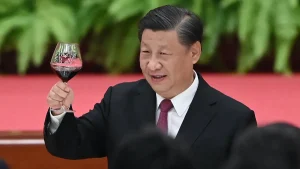Epiphany Moments of the Chinese: When did Western Discourse Stop Making Sense?
This week, a thread titled: “When did you start to stop believing in Western discourse?” gained immense popularity on China’s largest sports forum, “Hupu.”
“Hupu” boasts over 100 million fans and 80 million active users. As of now, the thread has accumulated 267 replies, second only to the“Top 30 NBA Stars of the New Season.”
 These are the most commonly used memes on “Hupu” .
These are the most commonly used memes on “Hupu” .
We browsed all the comments (so you don’t have to) to pinpoint the pivotal moments that shifted Chinese netizens’ views towards the narratives promoted by Western mainstream media:
@你无法在网络上说服任何人
Probably around the time Trump came to power. It was quite shocking.
@TIMMY_D风车
For me, it started when Huawei became the target of suppression.
Editor’s note: Amid the China–US trade war starting in 2018, the US accused Huawei of violating sanctions against Iran, leading to restrictions on its business with American companies. The US also sought the extradition of Huawei’s CFO from Canada. By 2022, the US FCC banned Huawei equipment over security concerns, followed by restrictions from the Five Eyes countries, India, Japan, and several EU states.
 Meng Wanzhou, CFO of Huawei and daughter of its founder, was detained in Canada on December 1, 2018, at the request of the U.S. Meng was under house arrest for nearly three years before reaching a deferred prosecution agreement with U.S. authorities on September 24, 2021.
Meng Wanzhou, CFO of Huawei and daughter of its founder, was detained in Canada on December 1, 2018, at the request of the U.S. Meng was under house arrest for nearly three years before reaching a deferred prosecution agreement with U.S. authorities on September 24, 2021.
@v三井v
Since the COVID-19 pandemic.

@一代须神詹姆士哈登
81192, please return.
Editor’s note: On April 1, 2001, a US reconnaissance plane entered Chinese airspace in the South China Sea. Chinese PLA Air Force sent two jets to intercept it. The US plane violated flight rules and collided with a Chinese jet, causing its pilot Wang Wei to crash. 81192 is the number of the jet that Wang Wei was flying at that time.
 Wang Wei
Wang Wei
@核动力电驴
When the J-20 fighter jet took to the skies, I realized China’s tech isn’t lagging behind.
Editor’s note: The Chengdu J-20 is China’s stealth fighter, first publicly displayed in 2016.
It is the third fifth-generation stealth fighter in the world to enter mass production and service, following the U.S. F-22 and F-35.
 J20
J20
@哥谭市一大杰出青年
After we had aircraft carrier battle groups and fifth-generation fighter jets, I noticed subtle changes in the attitude of Americans and neighboring countries.
@大西北杀猪刀
Since the exposure of the $16 billion anti-China fund.
Editor’s note: The “16 billion anti-China fund” refers to a recent U.S. congressional decision to allocate over $1.6 billion in public funds to counter what it describes as “malign Chinese influence” globally. This fund is part of the H.R.1157 bill passed in September 2023. The legislation allows for the deployment of these funds until 2027 to support activities that push back against China’s global influence, particularly in media and civil society sectors worldwide.

@牧云儿
When I was in college and used a VPN to see Twitter.
@为人精神不丢份待人有礼貌
When I studied and worked abroad, I stopped believing in anything the Western mainstream media says anymore.
@挥手拜拜
In 2004 and 2005, during Ukraine’s Orange Revolution, I saw too many photos of ordinary people, including pregnant women, being brutally harmed in Eastern Ukraine, while the Western mainstream media kept promoting Ukraine’s actions as a fight for freedom.
@Germany_cat
The way the Western mainstream media reported the Hong Kong Occupy Central movement completely changed my view on Western narratives. Then came the Xinjiang cotton incident, and by now, those who still believe in it are either fools or malicious.
Editor’s note: In 2021, BCI (Better Cotton Initiative) investigated the cotton supply chain in Xinjiang, China, claiming that there was forced labor and human rights violations. Without any factual basis, many well-known brands issued statements refusing to use Xinjiang cotton.
According to Chinese media reports, as early as 2019, the mechanized cotton harvesting rate in Xinjiang had already reached 42%. As of July 2020, Xinjiang had over 5,000 agricultural plant protection drones based on the Beidou navigation system, covering over 20 million mu (1.33 million hectares) just for pesticide spraying alone.
 A drone sprays pesticide at a cotton field in Korla, northwest China‘s Xinjiang Uyghur Autonomous Region, June 5, 2022。
A drone sprays pesticide at a cotton field in Korla, northwest China‘s Xinjiang Uyghur Autonomous Region, June 5, 2022。
@进击的艾伦耶格尔
When the West began losing market share in high-profit industries that sustained their welfare states, it became apparent that their previous sense of moral superiority was supported by economic strength; without it, the idea of freedom would be a luxury.
@hejiane1
Over ten years ago, I suddenly realized that the reason Western ideologies seemed so correct was because we judged them by the standards provided by these Western stories that their media promoted.
It’s like I’m the one who sets the food hygiene standards, and when I use those standards to judge, of course the food I produce will be the best.
In fact, the ability to objectively and impartially reflect on Western narratives may itself be a manifestation of Western-style logical thinking.
Among the comments under this thread, the most liked one would be one from @cp3uuu, who posted a picture as a response (1,150 likes).
The picture compiled a few Western anecdotes that have been published in China’s most-read magazines over the past 20 years. The most popular of these magazines, Reader, has had a total circulation of over 2 billion copies. It’s regarded as highly recommended reading material for students looking to enhance their writing skills.
Chinese netizens strongly resonated with the point that @cp3uuu was trying to make with the picture. In these stories, the Japanese are always portrayed honest, the Germans as rigorous, the British as studious, Australians as clean, and Jewish people as placing immense importance on education. The United States received the most praise: presidents cherish life, Harvard libraries are full of students at 4 a.m., and supermarket customers pay in the dark when the power goes out.
We translated the text in @cp3uuu’s photo commentary:
• Japan:
In Japan, dishes must be washed seven times. A Chinese student working part-time was fired by his boss because he only washed them five times. As a result, no restaurant would hire him, and even his landlord asked him to move out because he was dishonest.
• Australia:
To eliminate the problem of flies being attracted to decay, Australians have spent over 200 years thoroughly cleaning all public places across the country, eventually causing flies to live off nectar.
• Jews:
Jews make their children love reading by putting honey on books and letting the children taste the sweetness. This method is very effective, and many children grow up thinking books are sweet and delicious.
• Germany:
The sewers built by German colonizers in Qingdao have kept the city from flooding for over 100 years. Even 100 years later, a German company sent an email saying that spare parts wrapped in oil paper were hidden in the sewers and could be directly replaced.
• UK:
The British love to read. They read books and newspapers on the subway instead of looking at their phones, demonstrating a very rich intellectual world.
• USA 1:
During a sudden power outage at a supermarket, to prevent a stampede, an announcement was made that people could take their items for free. Upon hearing this, everyone left in an orderly manner, and when the power came back, the counters were filled with money.
• USA 2:
A sparrow got tangled in high-voltage wires. A passerby called the police, who notified the White House. The president decided to dispatch a special plane to knock down the country’s entire power grid temporarily, saving the sparrow—showing how a great country can pause for the life of even the smallest creature.
• USA 3:
At 4:30 in the morning, when Chinese students are still asleep, the best minds in the world—Harvard students—are already hard at work. At 4 a.m., the lights of Harvard’s library are brightly lit, filled with students studying seriously.

Under this picture, some netizens commented:
@节肢动物门软甲纲十足目:
The “seven-time dishwashing” story even made it into middle school textbooks, didn’t it?
@三旬老汉1201 (677 likes):
I seriously want to vomit. I’ve seen all of this before, and I want to go back in time and slap myself.
@Interestng:
Who wrote all this? I really want to know, are there author names?
@用户0818091766 replied:
Anonymous, I bet it’s the editors who wrote it themselves.
@康帅傅乌龙茶:
Looking back, I read and believed those stories at that time too. But I think what’s impressive about the Chinese culture is that after I absorbed those stories, my reaction was not merely admiration for these people, but a belief that one day we could be just like them.
@龙虎山天师府天通道人张之维:
I’m from the 90s, and when I was in school, teachers were always talking about how humane and rule-abiding foreigners were.
@酒水糊涂:
To be fair, even though these stories, which even Westerners haven’t heard of, are ridiculous, they indirectly raised Chinese people’s moral standards.
Among the many comments, one conversation stood out:
@panghumvp (309 likes):
Wealth hides a hundred flaws. Back in the day, when we looked up to the wealth and development of the U.S., everything America said sounded gold. Now that we’ve caught up to the point where we can clearly see America for what it really is, and as we’re getting closer and closer, it’s become obvious that the U.S. doesn’t deserve such blind admiration.
@hahaha2oo1 replied:
America was strong back then not just because of wealth but for many important reasons. But you’re right about the general public’s mentality, which is also an important factor.
Yes, the demystification of Chinese netizens today towards the Western narratives can be viewed as a response to their previous idealization of them. But now, amid the pager explosion scare in Lebanon, the possibility of Trump being re-elected as U.S. president, and the battlefields in Ukraine and Israel—the West’s own decline must also take accountability for the awakening of the Chinese people.
Editor: Zhongxiaowen
https://bbs.hupu.com/628093565.html



